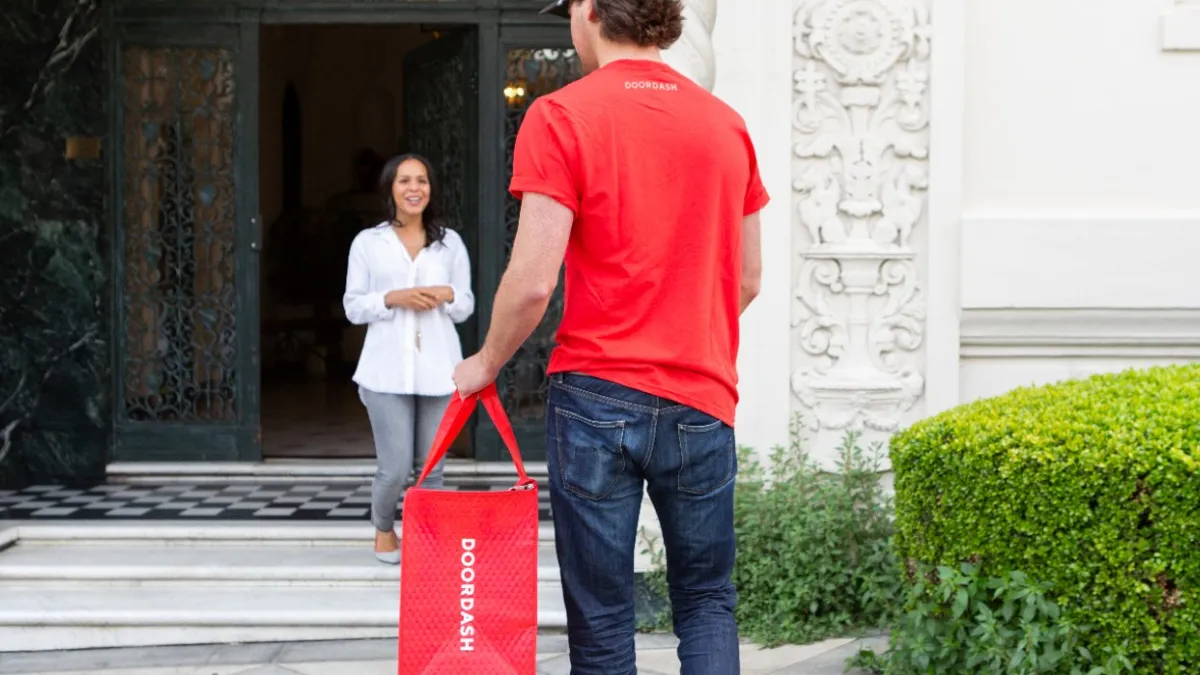Dive Brief:
- DoorDash has agreed to pay a $2.5 million settlement with the Washington, D.C., attorney general’s office over a November 2019 lawsuit that alleged the delivery company misled consumers to believe their tips would increase worker pay, according to a press release.
- An investigation by the office discovered those tips were used to instead subsidize DoorDash's payments to its workers from July 2017 to September 2019. As part of DoorDash's settlement, $1.5 million will go toward DoorDash's affected delivery workers, while $750,000 will be paid to the District to cover the cost of investigation and litigation and $250,000 will be donated to two Washington, D.C.-based charities.
- These allegations pertain to the company’s former pay model, which was changed over a year ago. DoorDash's new policy allows customers to tip before or after placing their delivery order, and Dashers are also able to view an inventory of their earnings in the DoorDash app.
Dive Insight:
This settlement ensures that DoorDash maintains transparency around its new model, guaranteeing tips go to workers without reduction of their base pay. The company is also required to clearly inform consumers and workers about how Dashers are paid and must disclose future changes to their tipping or payment models. This information is to be provided to consumers at checkout, and to workers for each delivery they make.
"Today's settlement rights a wrong that deceived D.C. consumers and deprived workers of monies that they should have paid," Washington, D.C., Attorney General Karle Racine said in a statement emailed to Restaurant Dive. "Gig economy companies provide important and necessary services, especially during the pandemic. However, the law applies to these companies, just as it does to their brick and mortar counterparts. All business in the District must provide consumers with truthful information and cannot deprive workers of monies they have earned. We are pleased that DoorDash has changed its policies, and with this settlement has taken responsibility for its actions."
DoorDash denied allegations of misleading consumers in its consent decree.
"We're pleased to have this issue behind us, and thank the Office of the Attorney General for DC for its work throughout this process. Our focus is on continuing to support Dashers, restaurants, and customers in DC and around the country," a DoorDash spokesperson said in a statement emailed to Restaurant Dive.
The settlement also comes less than two weeks after DoorDash filed to go public. In that filling, DoorDash said one significant risk to its business was if it failed "to cost-effectively attract and retain Dashers." Having this lawsuit unsettled could have deterred Dashers from joining (or staying with) the company, particularly as DoorDash's competitors — Grubhub, Uber Eats and Postmates — have long passed 100% of tips to their workers. DoorDash's tipping model change was a critical move to level the field with its competitors, particularly for potential workers and socially conscious consumers. It also made an immediate difference — DoorDash announced that new pay model grew Dasher pay by 12.5% on average, while overall earnings, including tips, rose by $1.30.
If there was any risk for a lingering fallout from this investigation, that seems to have faded. DoorDash's market share has grown significantly since its pay model change and the company commands 51% of the space as of October, according to Second Measure. Such a reputational recovery seems worth a $2.5 million payout, especially as DoorDash's overall value is expected to top $25 billion as it readies to begin trading on the NYSE in mid-December.
Fair wage efforts for gig workers is a hot button topic, particularly after Calfornia's Prop 22 passed, ensuring delivery companies were not required to reclassify their workers from contractors to employees entitled to certain benefits. Some cities are adopting policies to protect delivery drivers' pay. Chicago, for example, just approved a temporary 15% delivery cap. The ordinance requires aggregators to allow diners to send tips directly to restaurants and will not allow delivery companies to reduce driver pay or touch their tips.













